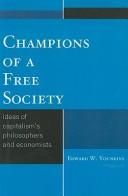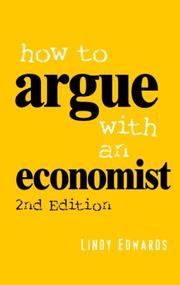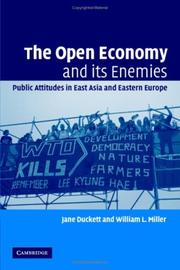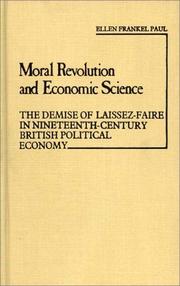| Listing 1 - 10 of 219 | << page >> |
Sort by
|

ISBN: 0739126474 0739130536 9780739130537 1299785875 9781299785878 9780739126479 9780739126486 0739126482 Year: 2008 Publisher: Lanham Lexington Books
Abstract | Keywords | Export | Availability | Bookmark
 Loading...
Loading...Choose an application
- Reference Manager
- EndNote
- RefWorks (Direct export to RefWorks)
This book is written for individuals who want to learn about the philosophical foundations of political and economic freedom. It is an introduction and a guide to the principal theoretical ideas on liberty produced by the most influential and creative thinkers in history, with chapters on Adam Smith, Ludwig von Mises, and Carl Menger.
Capitalism --- Free enterprise --- Economics --- Free markets --- Laissez-faire --- Markets, Free --- Private enterprise --- Economic policy --- Philosophy.
Book
ISBN: 9292577441 9292577433 Year: 2017 Publisher: Metro Manila, Philippines : Asian Development Bank,
Abstract | Keywords | Export | Availability | Bookmark
 Loading...
Loading...Choose an application
- Reference Manager
- EndNote
- RefWorks (Direct export to RefWorks)
Free enterprise --- Free markets --- Laissez-faire --- Markets, Free --- Private enterprise --- Economic policy --- Pacific Area --- Economic policy.
Film
Year: 2023 Publisher: London : Henry Stewart Talks,
Abstract | Keywords | Export | Availability | Bookmark
 Loading...
Loading...Choose an application
- Reference Manager
- EndNote
- RefWorks (Direct export to RefWorks)
Crowd funding. --- Venture capital. --- Business enterprises --- Corporations --- Cryptocurrencies. --- Free markets. --- Investments. --- Stock exchanges. --- Stockholders. --- Stocks --- Valuation. --- Finance. --- Prices.
Book
ISBN: 1944424512 9781944424510 9781944424503 Year: 2017 Publisher: Washington, D.C.
Abstract | Keywords | Export | Availability | Bookmark
 Loading...
Loading...Choose an application
- Reference Manager
- EndNote
- RefWorks (Direct export to RefWorks)
When we stop to consider it, a free economy is a marvel. Millions of people, mostly unknown to one another, each producing some particular good or service, somehow manage to coordinate their actions in a vast, cooperative, productive order with no one in charge. How does it work? Economics helps us understand and this introduces the concepts on which all of economics is founded.
Economics. --- Free enterprise. --- Free markets --- Laissez-faire --- Markets, Free --- Private enterprise --- Economic policy --- Economic theory --- Political economy --- Social sciences --- Economic man
Book
ISBN: 0255367775 0255367783 9780255367776 9780255367769 Year: 2019 Publisher: London, England : Institute of Economic Affairs,
Abstract | Keywords | Export | Availability | Bookmark
 Loading...
Loading...Choose an application
- Reference Manager
- EndNote
- RefWorks (Direct export to RefWorks)
Liberalism. --- Economic history. --- Free enterprise. --- Free markets --- Laissez-faire --- Markets, Free --- Private enterprise --- Economic policy --- Economic conditions --- History, Economic --- Economics --- Liberal egalitarianism --- Liberty --- Political science --- Social sciences

ISBN: 9780511481666 9780521699433 9780511296581 0511296584 0511295812 9780511295812 0511292643 9780511292644 0521699436 0511481667 1107173574 9781107173576 9786610959723 6610959722 1139132997 9781139132992 0511295049 9780511295041 0511294247 9780511294242 128095972X Year: 2007 Publisher: Cambridge, UK New York Cambridge University Press
Abstract | Keywords | Export | Availability | Bookmark
 Loading...
Loading...Choose an application
- Reference Manager
- EndNote
- RefWorks (Direct export to RefWorks)
This fascinating book reflects on how economics has become central to our lives, and how the 'economic rationalist' perspective has become the lens through which all matters in Australian public life are viewed. It explains how this economic worldview systematically overlooks important social issues and how it transforms Australian culture. How to Argue with an Economist invites a broad general audience into debates that were once reserved for experts. Lindy Edwards, a former economic adviser in the Prime Minister's Department, has a talent for expressing concepts simply. She distils economics' key ideas into a lively and enjoyable read, explaining how economists think and then how you can argue with them.
Free enterprise --- Australië --- economische politiek --- markteconomie --- Free markets --- Laissez-faire --- Markets, Free --- Private enterprise --- Economic policy --- Australia --- Economic policy. --- Politics and government --- Business, Economy and Management --- Economics

ISBN: 9780511491825 9780521864060 9780521682558 9780511261367 0511261365 0511260792 0511259565 9780511259562 9780511260797 9786610749355 6610749353 0521864062 052168255X 0511491824 1107169305 9781107169302 1280749350 9781280749353 0511320108 9780511320101 0511260237 9780511260230 Year: 2006 Publisher: Cambridge New York Cambridge University Press
Abstract | Keywords | Export | Availability | Bookmark
 Loading...
Loading...Choose an application
- Reference Manager
- EndNote
- RefWorks (Direct export to RefWorks)
There is a vigorous debate about the merits of globalisation for developing countries. Based on numerous focus-group discussions and over 10,000 interviews, this book studies economic and cultural openness from the perspective of the public in four developing or 'transitional' countries: Vietnam, (South) Korea, the Czech Republic and Ukraine (both before and after the Orange Revolution). It finds many supporters of opening up, but also many who are discontented with its downsides and who expect states to tackle the exploitation and unfairness that accompany it. Among the most fervent enemies of openness there is support not just for peaceful public protest to tackle the problems it brings, but for violence or sabotage. The methodology provides a unique opportunity for the public in developing countries to 'speak with their own voices' about markets and openness - and highlights the subtlety, ambiguity, tensions, conflicts and emotion that statistics alone fail to capture.
Free enterprise --- Free markets --- Laissez-faire --- Markets, Free --- Private enterprise --- Economic policy --- Public opinion. --- Vietnam --- Korea (South) --- Czech Republic --- Ukraine --- Social Sciences --- Political Science
Book
ISBN: 1108556663 1108676618 1108628079 1108470483 Year: 2018 Publisher: Cambridge : Cambridge University Press,
Abstract | Keywords | Export | Availability | Bookmark
 Loading...
Loading...Choose an application
- Reference Manager
- EndNote
- RefWorks (Direct export to RefWorks)
Globalization is triggering a 'revenue shock' in developing economies. International trade taxes - once the primary source of government revenue - have been cut drastically in response to trade liberalization. Bastiaens and Rudra make the novel argument that regime type is a major determinant of revenue-raising capacity once free trade policies have been adopted. Specifically, policymakers in democracies confront greater challenges than their authoritarian counterparts when implementing tax reforms to offset liberalization's revenue shocks. The repercussions are significant: while the poor bear the brunt of this revenue shortfall in democracies, authoritarian regimes are better-off overall. Paradoxically, then, citizens of democracies suffer precisely because their freer political culture constrains governmental ability to tax and redistribute under globalization. This important contribution on the battle between open societies and the ability of governments to help their people prosper under globalization is essential reading for students and scholars of political economy, development studies and comparative politics.
Taxation --- Democracy --- Free enterprise --- Finance, Public --- Free markets --- Laissez-faire --- Markets, Free --- Private enterprise --- Economic policy --- Developing countries --- Politics and government. --- Economic conditions.
Book
ISBN: 9780191893308 9780198861201 0198861206 Year: 2022 Publisher: Oxford : Oxford University Press
Abstract | Keywords | Export | Availability | Bookmark
 Loading...
Loading...Choose an application
- Reference Manager
- EndNote
- RefWorks (Direct export to RefWorks)
Since the financial crisis of 2008, Ordoliberalism emerged from relative obscurity to become one of the crucial terms of analysis across a wide range of academic literatures and public discussion. In fact, it became the main reference for a number of issues, including assessments of the attempted resolution of the Eurozone crisis, arguments about German hegemony in Europe, debates over the future of economic liberalism and controversies about authoritarian liberalism. What is striking about Ordoliberalism is its pronounced ambiguity, as some view it as a more refined and potentially progressive variant of neoliberalism, while others cast it as a blueprint for a regime of austerity reigning over a society of competition with only rudimentary democratic institutions. And while Ordoliberalism is often portrayed as a quintessentially German tradition, its impact has not been confined to the German context. In short, Ordoliberalism is a phenomenon of arguably considerable influence that remains poorly understood, as it is mystified by its proponents and vilified by its critics. In this book the editors have compiled a selection of chapters, written by an international cast of experts on Ordoliberalism, that aim to elucidate and analyse the latter in all of its many facets. From the intellectual origins and prime exemplars to its main theoretical themes and practical applications up to the most recent debates taking place across a range of disciplines, this volume offers the first comprehensive account of Ordoliberalism for the English-speaking world.
Liberalism --- Free enterprise --- Free markets --- Laissez-faire --- Markets, Free --- Private enterprise --- Economic policy --- Liberal egalitarianism --- Liberty --- Political science --- Social sciences --- Economic aspects --- History

ISSN: 00849235 ISBN: 0313210551 9780313210556 Year: 1979 Volume: 23 Publisher: Westport, Conn. Greenwood
Abstract | Keywords | Export | Availability | Bookmark
 Loading...
Loading...Choose an application
- Reference Manager
- EndNote
- RefWorks (Direct export to RefWorks)
Economic schools --- anno 1800-1899 --- Great Britain --- Economics --- Free enterprise --- History --- -Free enterprise --- -Free markets --- Laissez-faire --- Markets, Free --- Private enterprise --- Economic policy --- Economic theory --- Political economy --- Social sciences --- Economic man --- -History --- Free markets --- Economics - Great Britain - History - 19th century --- Free enterprise - History - 19th century --- Laissez-faire - History
| Listing 1 - 10 of 219 | << page >> |
Sort by
|

 Search
Search Feedback
Feedback About UniCat
About UniCat  Help
Help News
News